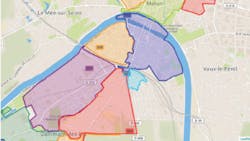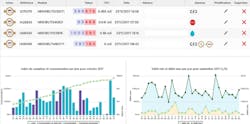In almost every industry, connectivity is enabling the development of new technologies and allowing businesses to make data more actionable. This is no different for utility companies, who are employing smart water management solutions to collect data remotely and streamline operations.
Historically, water utility operations were laborious and required extensive measurement and action by field personnel. Early connected solutions relied on remote reading through short-range wireless devices and a technician needed to be onsite to retrieve data. Over time, industry leaders have helped water utilities stay responsive, lean, and resourceful by deploying smart metering systems to replace outdated, labor-intensive processes.
The IoT industry is having a direct impact on smart metering as cities and businesses look at new ways to assist with monitoring and controlling various operations. Technology research company Omdia recently forecasted that the global installed base of smart water meters will increase by 150 percent from 2016 to 2023. The firm added that between 2016 and 2023, water utilities will spend over $576 million on data-based managed services for smart meters.
A smart sensor infrastructure can provide organizations increased operational savings yearly. Smart water metering and leak detection alone can save 20 percent on water leakage levels and reduce energy consumption by 30 percent through smart water infrastructure.
Birdz, a branch of Nova Veolia, has over 19 year of experience creating remote metering solutions for smart cities. The company provides water utility operators with a wide range of services, including traditional remote index reading, billing support, leak detection, potential fraud monitoring, subscriber consumption modeling and forecasting.
To optimize their offerings, Birdz created a smart water sensor solution that allows their customers to manage utilities more efficiently. By integrating IoT-based sensor technology with an existing infrastructure, Birdz smart metering solution has the ability to provide strong connectivity both outdoors and indoors in a dense city setting. This IoT solution utilizes services and devices in an existing network, such as water leak detectors, fire hydrant monitors and water quality probes, to provide better coverage and grow existing networks to connect even more devices to meet customer needs.
Birdz also provides smart hybrid solutions that make it easy for utilities to switch from automated meter reading solutions, which provide data only at monthly or quarterly intervals, to a fixed long range advanced metering infrastructure that allow hourly or daily data transfer over secure networks for more efficient utility management and billing.
Transforming Eau Du Grand Lyon
Customers are leveraging these solutions to make a real-world impact. One example is the city of Lyon, France, which has seen significant benefits since implementing over 400,000 smart-based sensors.
With the remote water management solution from Birdz, Lyon implemented module meters for residential and business facilities, water quality probes and noise correlator sensors on the city’s piping infrastructure. These acoustic sensors evaluate the sound of water flowing inside pipes to easily detect and accurately pinpoint leaks.
The IoT-based sensors leverage an existing network to communicate, transmit data and provide alerts. Birdz provided Lyon with a grid management platform to correlate all incoming data and visually display key metrics on a customized dashboard. This service provides daily calculations of several key performance indicators for the water grid, including volume of water supplied, volume of water consumed, apparent losses, grid output, linear loss index (LLI) and nighttime flow.
Since deployment, the solution’s geolocation capabilities identified over 1,200 water leaks – which allowed for quick repairs. Due to the improved performance, around one million cubic meters of water is saved annually. Additionally, Lyon has seen an eight percent increase in water network efficiency from 77 percent in 2015, to 85.2 percent in 2019.
IoT-based smart metering solutions with long range and low power capabilities are finding the most success in the utility vertical. This type of solution allows utility companies to collect data faster and more efficiently, streamlining the deployment of smart and more sustainable solutions. WW
About the Author: Rémi Demerlé is the director of utilities market in Semtech’s Wireless and Sensing Products Group.
About the Author
Rémi Demerlé
Rémi Demerlé is the director of utilities market in Semtech’s Wireless and Sensing Products Group.

